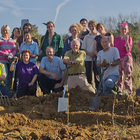The National Planning Policy Framework - is it all bad news for reptiles and amphibians?

‘Yes’ I hear many of you cry – and in essence that is the problem with the National Planning Policy Framework (NPPF), the Government’s new planning proposals for England. The headline messages are simply not strong enough in favour of conserving the natural environment and, partly as a consequence of this, the document reads like a developers’ charter. Emphasising as it does the need for a strong ‘pro-economic growth’ agenda’, the current wording threatens to jeopardise large areas of our countryside and many of the ‘brownfield’ sites (derelict/ former industrial land) that are so important for reptiles and amphibians.
There are, however, some principles within the NPPF that we at Amphibian and Reptile Conservation (ARC), and others in Wildlife & Countryside Link, the NGO forum through which we do much of our campaigning work on Planning legislation and policy, do subscribe to. We support Sustainable Development (with the emphasis on Sustainable!), we see a benefit in a more proportionate and locally accountable planning system and we see value in a ‘plan led’ approach that can define conservation as well as socio-economic objectives for an area. The 58 page document is meant to be read and considered in its entirety – for those with the stamina to reach clause 163 there is a section on the Natural Environment and scattered through it are little nuggets that could give us hope, had we not been distracted by the less positive messageselsewhere.
ARC, through W&C Link, is actively campaigning to address some key over-riding issues, and in particular:
- the need for a clear and workable definition of sustainable development;
- that there should only be a presumption in favour of development that clearly accords with an appropriate definition of the term ‘sustainable development’; and
- clear links must be made between the NPPF and the Natural Environment White Paper.
The Prime Minister has recently made a personal intervention and has emphasised his commitment to safeguarding our countryside – but we also wish to see wildlife conserved throughout England and not just in our designated National Parks. For truly sustainable development to happen as a result of the NPPF, the whole document must reflect the fact that our long term economic growth relies on protecting and enhancing the environmental resources that underpin it, also paying due regard to social needs. Without this basis, the presumption for ‘sustainable development’ will simply be a licence for ‘sustained development’. The NPPF, as written, has rightly angered many environmental and local organisations and has sustained a barrage of criticism in the press. Let us hope that the Government is listening and takes this opportunity to create a planning system that delivers truly sustainable development - a thriving economy alongside flourishing wildlife. ARC will continue to campaign to try to make this happen.
The opportunity for Public comments continues until 17th October (seehttp://www.communities.gov.uk/planningandbuilding/planningsystem/planningpolicy/planningpolicyframework/ we would encourage you to have your say).
Tony Gent
CEO Amphibian & Reptile Conservation



